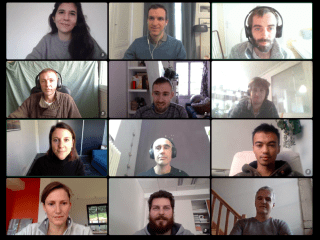The Cocoon Group
Members

Directeur de recherche
CNRS
Tel: 33 04 26 23 44 74

Chargé de recherche
CNRS
Tel: 04 72 43 29 09
Doctorant
UCBL
Tel: 04 72 44 81 42

Directeur de recherche
INRIA
Tel: 33 04 26 23 44 74
Le Cocon is both a research team and a think tank.
Research in “Le Cocon” team focuses on two main topics: multiscale evolution on one hand (i.e., studying the evolution of genetic systems while considering different levels -nucleotides, transposable elements, genes, genomes, microbiomes, organisms, populations, species, geography-), and environmental issues on the other hand. In both cases, we rely on modeling and data analysis, using a combination of statistics and computer science.
Le Cocon is also a place to think about the responsibilities of research and researchers in the anthropocene era, and about the role of non-researcher citizens in orienting and conducting research.
Multiscale evolution
- We have a long history of working on gene transfers. We develop new methods to detect these events in complex systems involving more than two levels (host, symbiont and parasites for example) and
- We use horizontal transfer detection to date species trees and to infer yet unknown biodiversity (extinct and unsampled) (Sthoriz (ANR, 2018)) .
- We have a lasting interest into convergent genomic evolution (Convergenomics - ANR, 2015)
- We question the usual way of testing bioinformatic methods (Evoluthon - ANR, 2019)
- We study the interaction between human populations, their lifestyles, and their gut microbiota (Microregal - ANR, 2015). We are notably interested in identifying cases of host-microbe coevolution and in better understanding transmission dynamics.
Environmental issues
- We develop computational methods to support an agriculture that relies on ecosystemic relationships between crops, the soil, its microbiota, and wild plants and animals (Community Garden Book - Inria, 2019)
- We develop statistical approaches to understand and predict crop yield variability with respect to meteorological conditions
Research in the anthropocene
- We participate to the science shop (UdL), the ethics platform (UdL), Labo1.5, the open science committee, Sciences Citoyennes, the shift project
- We organize a series of seminars to help us think about the position of scientific research in the history of the anthropocene, and about the position of scientists in the future of the anthropocene.
- We assemble committees of citizens to investigate to what extent scientific research can be democratized.
Teaching and outreach
- We teach at University of Lyon, University Lyon 1, INSA, Inria, ENS Lyon, we organize bioinformatics internships
- We regularly participate in the Fête de la Science, have contributed videos in the public transportation system in Lyon, give conferences at Université Populaire and contribute articles in general public journals.
- We develop the software Lifemap to explore the tree of life on computers and smartphones.
Prospective students and postdocs are invited to apply, as we often welcome visitors for internships or research projects.
Publications
Display of 31 to 60 publications on 222 in total
Ghost lineages highly influence the interpretation of introgression tests
Systematic Biology . 71 ( 5 ) : 1147–1158
Journal article
see the publicationSeaview Version 5: A Multiplatform Software for Multiple Sequence Alignment, Molecular Phylogenetic Analyses, and Tree Reconciliation
Multiple Sequence Alignment . 2231 : 241-260
Book chapter
see the publicationTreerecs: an integrated phylogenetic tool, from sequences to reconciliations.
Bioinformatics . 36 ( 18 ) : 4822-4824
Journal article
see the publicationAncestral Genome Organization as a Diagnosis Tool for Phylogenomics
Phylogenetics in the Genomic Era . : 2.5:1--2.5:19
Book chapter
see the publicationGenome Evolution: Mutation Is the Main Driver of Genome Size in Prokaryotes
Current Biology . 30 ( 19 ) : R1083-R1085
Journal article
see the publicationEvolutionary superscaffolding and chromosome anchoring to improve Anopheles genome assemblies
BMC Biology . 18 ( 1 ) : 1-20
Journal article
see the publicationGlobal survey of mobile DNA horizontal transfer in arthropods reveals Lepidoptera as a prime hotspot
PLoS Genetics . 15 ( 2 ) : e1007965
Journal article
see the publicationZombi: A phylogenetic simulator of trees, genomes and sequences that accounts for dead lineages
Bioinformatics .
Journal article
see the publicationQuand les branches de l’arbre du vivant s’entremêlent
Pour la science .
DOI: 10.3917/pls.506.0056
Journal article
see the publicationTanglegrams Are Misleading for Visual Evaluation of Tree Congruence
Molecular Biology and Evolution . 36 ( 1 ) : 174-176
Journal article
see the publicationTracing Human Ancestral Migrations Using Symbiotic Bacteria
Groupe des Méthodes Pluridisciplinaires Contribuant à l'Archéologie (GMPCA) .
Conference paper
see the publicationGene tree reconciliation including transfers with replacement is NP-hard and FPT
Journal of Combinatorial Optimization . 38 ( 2 ) : 502–544
Journal article
see the publicationGene tree species tree reconciliation with gene conversion
Journal of Mathematical Biology . 78 ( 6 ) : 1981–2014
Journal article
see the publicationGene transfers can date the tree of life
Nature Ecology & Evolution . 2 ( 5 ) : 904-909
Journal article
see the publicationCoexistence of two sympatric cryptic bat species in French Guiana: insights from genetic, acoustic and ecological data
BMC Evolutionary Biology . 18 ( 1 )
Journal article
see the publicationCoexistence de deux espèces cryptiques de chauves-souris en Guyane française : apprentissages à partir de la génétique de l’acoustique et de l’écologie
Plume de Naturalistes . 2 : 169-190
Journal article
see the publicationCo-occurrence among three divergent plant-castrating fungi in the same Silene host species
Molecular Ecology . 27 ( 16 ) : 3357 - 3370
DOI: 10.1111/mec.14805
Journal article
see the publicationGearing up to handle the mosaic nature of life in the quest for orthologs
Bioinformatics . 34 ( 2 ) : 323-329
Journal article
see the publicationOvertraining often results in topologically incorrect species trees with maximum likelihood methods
DOI: 10.1101/140780
Preprint
see the publicationRecPhyloXML: a format for reconciled gene trees
Bioinformatics . 34 ( 21 ) : 3646-3652
Journal article
see the publicationMultiple convergent supergene evolution events in mating-type chromosomes
Nature Communications . 9 ( 1 ) : 2000
Journal article
see the publicationPhylogenetic signal from rearrangements in 18 Anopheles species by joint scaffolding extant and ancestral genomes
BMC Genomics . 19 ( S2 ) : 1-15
Journal article
see the publicationBiodiversité, évolution et fonctionnement des écosystèmes
Les Cahiers des prospectives . hors série : 25-33.
Book chapter
see the publication
